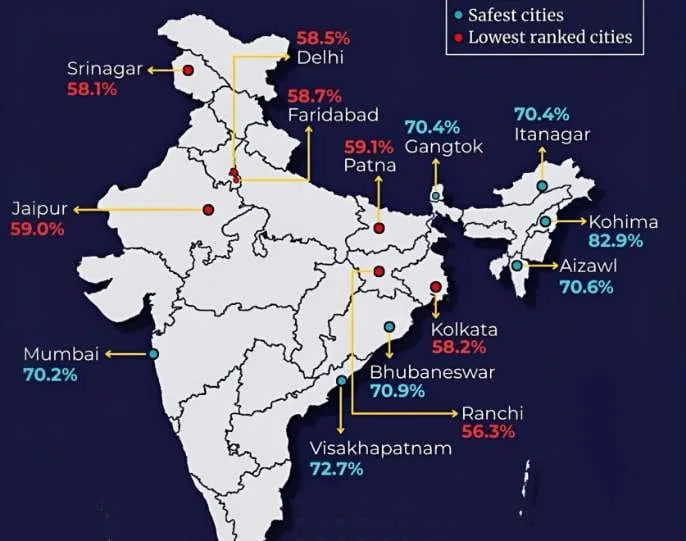The NARI 2025 Index is India’s first national annual index on urban women’s safety released by the National Commission for Women(NCW) in partnership with major research organizations. It offers an in-depth look at safety as experienced by women in 31 major cities, combining official crime statistics with survey insights from 12,770 women across the country.
Structure and Methodology of survey of The Nari 2025 index
- The survey included 31 cities from all Indian states, reflecting a significant sample of urban women’s experiences
- The index gives a national women’s safety score of 65% and classifies cities as “much above,” “above,” “below,” or “much below” the benchmark.
- It measures overall safety, quality of infrastructure like lighting and transport, security in different areas such as neighborhoods, schools, workplaces, healthcare facilities, recreational spaces and online platforms as well as the incidence and reporting of harassment and trust in authorities.
Safety Perceptions and Realities

- 40% of urban women feel “unsafe” or “not so safe.” Six out of ten urban women generally feel safe in their city but their sense of safety drops significantly at night, especially in public transport and recreational areas
- Young women under 24 are particularly vulnerable 14% reported some form of harassment in 2024.
- Verbal harassment is the most common type at 58%, followed by physical, psychological, sexual and economic harassment.
- Only 22% of cases are reported to authorities and just 16% result in any action, indicating major gaps in institutional response and trust.
City Rankings
| Top Ranked City | Bottom ranked city |
| Kohima, Visakhapatnam, Bhubaneswar | Patna, Jaipur, Faridabad, Delhi, Kolkata |
| Aizawl, Gangtok, Itanagar, Mumbai | Srinagar, Ranchi |
- Safer cities tend to have better gender equity, civic participation, responsive policing and women-friendly infrastructure
- Cities at the bottom of the index struggle with weak institutional support, deeply rooted patriarchal norms, and gaps in urban infrastructure and law enforcement.
- 7% of surveyed women experienced public harassment in 2024, with young women and students facing much higher rates.
- Only a third of victims file formal complaints, and just a quarter believe authorities will take action, showing a significant issue with underreporting and a lack of trust.
- More than half (53%) do not know if their workplace has a POSH (Prevention of Sexual Harassment) policy.
Policy Implications
- The NARI 2025 Index offers policymakers, businesses and civil society a data-driven way to create safer, more inclusive urban environments, supporting the larger vision of Viksit Bharat 2047.
- The findings highlight the need to strengthen urban infrastructure, increase visible policing, improve street lighting and promote gender equity in institutions.
- The report emphasizes that women’s safety should be seen not just as a law-and-order issue but as vital to education, health, employment and overall freedom. visit here
” Though India’s national safety score of 65% shows a slight improvement, the significant differences between cities and ongoing systemic barriers expose serious challenges. The NARI 2025 Index calls for urgent policy attention to infrastructure, awareness, social norms and enforcement to ensure urban safety for women becomes a lived experience rather than just a statistic” for social issue link yourself here



























